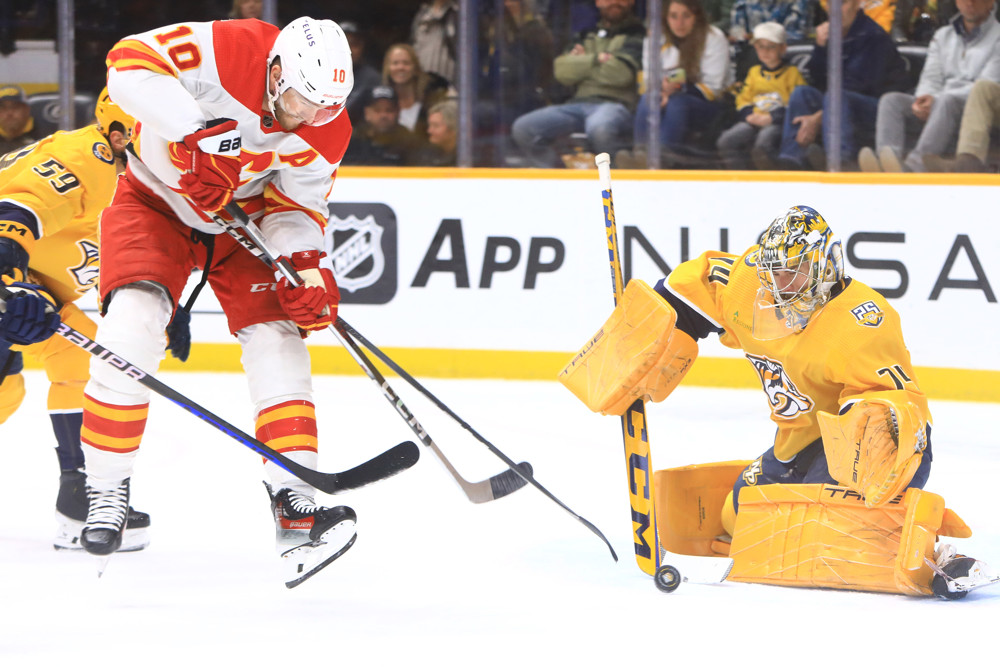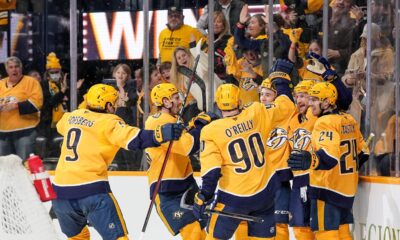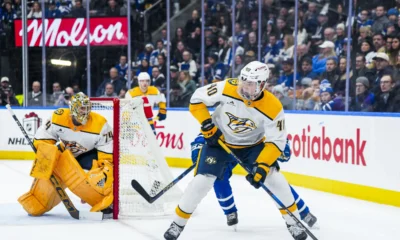By no means could you blame the Nashville Predators’ 6-3 loss to the Calgary Flames entirely on Juuse Saros. After all, the team in front of him gave up 25 shots in his two periods of play, four more than Saros faced during the entirety of Tuesday’s shutout against the Blackhawks. And many of those came at point-blank range.
The Flames outshot the Predators 39-32 over the course of the game. Per NaturalStatTrick, the Predators also allowed a whopping 22 high-danger chances, almost double their team average of 11.67 allowed per game.
“It wasn’t on him, it was on our group,” head coach Andrew Brunette responded when asked about Saros’s performance. “Our group, for whatever reason, did not understand the importance of tonight.”
The result was another ugly loss in front of the home crowd at Bridgestone Arena. Saros allowed four goals in the first period and a fifth in the second before being replaced by Kevin Lankinen during the second intermission, a move that Brunette felt was more a message to the team than an indictment of Saros.
“He kept us in the second period. We weren’t very good in the second for the most part. I think we were just thinking ‘give Lanks some time’ and we’ll make a decision for Saturday. Lanks hasn’t played for a bit. We were in a position where we weren’t playing very good hockey, and we didn’t want to leave him in there.”
“We certainly weren’t good enough in front of Juice at the beginning of the game,” Ryan McDonagh said after the loss. “We defended really well all season. Tonight there were way too many grade-A looks and chances from being way too slow and sloppy.”
But while his team shoulders the blame, Thursday’s loss is the latest in a series of rough outings for Saros. It was the third time he’s been pulled from a game since December 19th and the fifth time this season. It was also the third time in four games he’s allowed five goals. In his last seven starts, he’s 2-4-1 with an .859 save percentage.
While Saros has had his fair share of highlights this year, including a brilliant stretch between mid-November and early-December that saw him will the Predators to a handful of stolen wins, he hasn’t had quite the same impact fans have come to expect from their franchise goalie. His .901 save percentage is 39th in the NHL among goalies with at least 300+ minutes of ice time this season (his career average is .919.) His Goals Saved Above Expected/60 has also dropped to -0.07, meaning during the course of an average game, he’s allowing more goals than the analytics say he should be.
| Season | GP | Save% | HDSV% | GSAA |
| 2019-20 | 40 | .914 | .798 | 5.3 |
| 2021 | 36 | .927 | .844 | 20.9 |
| 2021-22 | 67 | .918 | .843 | 23.0 |
| 2022-23 | 64 | .919 | .841 | 30.0 |
| 2023-24* | 31 | .901 | .809 | -2 |
So that leads us to an important question: Should we be concerned with Saros’s play?
While his defense may have left him out to dry in some of these games, we’ve become used to seeing Saros thrive in these exact situations. We’re used to seeing him backstop the Predators to wins they had no business getting. We’re used to seeing the defense in front of him give up 40 shots in a game, and we’re used to seeing him leave the ice with 39 saves. We’re used to seeing him carry teams that should be in the lottery pick discussion into the playoff picture.
There have been noticeably fewer of those game-changing performances this season compared to years past. Take the Flames game for example. Yes, three of those five goals were the direct result of turnovers leading to odd-man rushes, but the ensuing shots were chances we’ve seen Saros stop routinely.
But while you can forgive Saros for games like Thursday, we’ve also seen the reverse scenario: games in which the Predators have played well enough to win (or at least be in a position to win), but were undone by iffy goaltending. Last week’s 5-4 overtime loss to the Detroit Red Wings was a prime example of that. Saros allowed five goals despite the Preds limiting Detroit to just 23 shots on goal.
As a whole, the defense in front of Saros has been much improved compared to previous years. The Predators as a team are allowing fewer shots on goal, fewer high-danger chances, and fewer expected goals. Saros’s workload has decreased significantly, something fans had hoped would lead to even better performances from their franchise goalie. But for whatever reason, that hasn’t been the case, which may be cause for concern.
While there’s plenty of blame to go around for the Preds’ recent slide, the bottom line is that they need Juuse Saros to be better. The Predators are a team in transition; there are going to be sloppy performances or nights in which they’re simply outmatched by an elite team. They’re going to need to rely on Saros keeping them in contention during those games, and on the flip side, ensuring the Preds do secure a win on the nights where they outplay their opponents.
There’s still over half of the season to go, and this is typically the time of year Juuse Saros becomes “VINTAGE SAROS.” The Preds are hoping that trend continues down the stretch. If so, the Preds may once again find themselves — somehow — in contention for a playoff spot. If not, they could be in for a rough finish to the 2024 season.

















